Sacraments
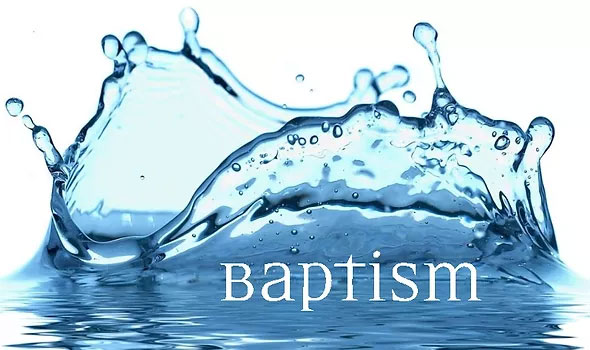
Baptism
From the Catechism of the Catholic Church (CCC, 1213):
Holy Baptism is the basis of the whole Christian life, the gateway to life in the Spiritand the door which gives access to the other sacraments. Through Baptism we are freed from sin and reborn as sons of God; we become members of Christ, are incorporated into the Church and made sharers in her mission: “Baptism is the sacrament of regeneration through water in the word.”
How do I arrange for Baptism at St. Francis Xavier Church?
Parents requesting the Sacrament of Baptism for their children should be registered and practicing members of the parish. Parents are obliged to see that infants are baptized within the first weeks after birth and are to be properly prepared for both living out the commitment they are making to raise their baptized child in the Catholic faith and for being able to celebrate the Sacrament of Baptism with a clear understanding of the Sacrament. Parents are encouraged to attend baptismal preparation before their child is born, then immediately after the child is born, a Baptism can be scheduled. As soon as possible after the birth, parents should request the Sacrament for their child by contacting the parish office at (573) 395-4401
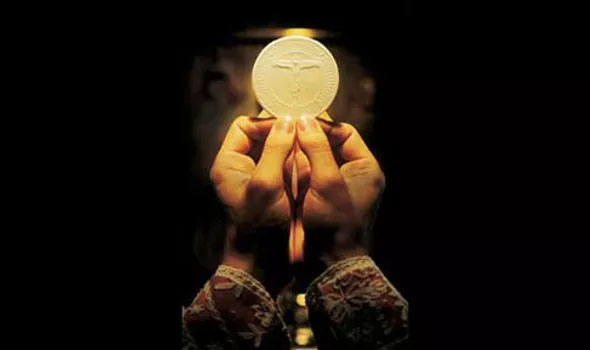
Eucharist (CCC 1322 – 1419)
What is the Eucharist?It is the bread and wine that by the words of consecration have become the Body and Blood of Jesus Christ. This inner transformation is referred to as “transubstantiation.” Transubstantiation means that while the Body and Blood still retain the outward physical properties of bread and wine, at the words of consecration, their very substance is permanently changed so that they become in fact, the Body and Blood of Christ. (CCC 1374-76)
For this reason, the consecrated hosts that are not consumed at any given Mass are reserved in a special retaining vessel known as the “tabernacle. The tabernacle is made a holy object by the content which it holds: Christ himself. Reserved consecrated hosts are later distributed to the sick and elderly. The Precious Blood because of the properties of wine that will spoil, must be consumed entirely at the Mass in which it was consecrated.
Proper Reception of the Eucharist:
Because we are receiving Christ himself at the Eucharist, Catholics must be in a “state of grace.” A state of grace means that we are free of any serious sin, and living according to the teachings of the Catholic Church. For adults, this includes if we are married, we are married by the Church. If we are single, we are living chastely. (CCC 1384-1395, 1415)
If one is conscious of grave sin, he or she must make amends to correct the situation and seek forgiveness through the Sacrament of Reconciliation (Confession) prior to reception of the Eucharist.
We are to fast for at least one hour prior to the reception of the Eucharist. Fasting is from food or beverage, including gum, and candy. Drinking water or taking necessary medication is permitted.

Confirmation (CCC Part Two, Section Two, Ch. One, Article 2)
Together with Baptism and the Eucharist, the sacrament of Confirmation completes the “Sacraments of Christian Initiation,” as such, the unity of these rites must be safeguarded. The final completion of Baptismal Grace is essentially completed by the sacrament of Confirmation. Through the sacrament of Confirmation, the baptized are more perfectly bound to the Church thus enriched with a special strength of the Holy Spirit.
With the sacrament of Confirmation, the baptized now become a true witness of Christ, and charged with a higher obligation to spread and defend the faith through word and deed. The seeds of the sacrament of Confirmation can be traced back to the Acts of the Apostles, specifically Acts 8:14-17, which states that “Now when the apostles in Jerusalem heard that Samaria had accepted the word of God, they sent them Peter and John, who went down and prayed for them, that they might receive the Holy Spirit, for it had not yet fallen upon any of them; they had only been baptized in the name of the Lord Jesus. Then they laid hands on them and they received the Holy Spirit.”
One of the immediate images of the Sacrament of Confirmation is the laying of hands, as mentioned in Acts 8:14-17, and 19:6. While this is obviously important, the essential element of the Sacrament of Confirmation is the anointing of the confirmand (the one who is being confirmed) with an aromatic oil known as chrism, accompanied by the words “Be sealed with the Gift of the Holy Spirit.”
This seal is the consecration, representing the final safeguarding by the Holy Spirit of the graces conferred during the Rite of Baptism.
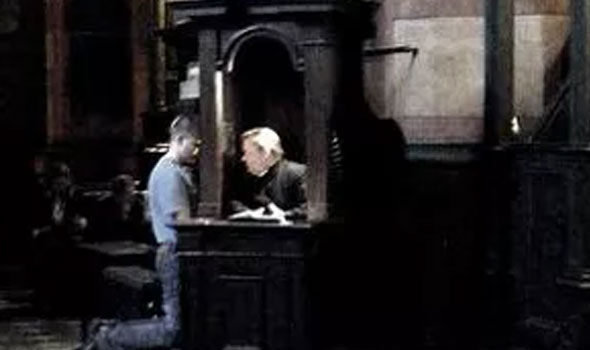
Confession
From the Catechism of the Catholic Church (CCC, 1496):
The spiritual effects of the sacrament of Penance are:
– reconciliation with God by which the penitent recovers grace;
– reconciliation with the Church;
– remission of the eternal punishment incurred by mortal sins;
– remission, at least in part, of temporal punishments resulting from sin;
– peace and serenity of conscience, and spiritual consolation;
– an increase of spiritual strength for the Christian battle.
When can I go to confession at St Francis Xavier Church?
Confessions are available every Saturday at 4:15 pm and also upon request. (see home page)
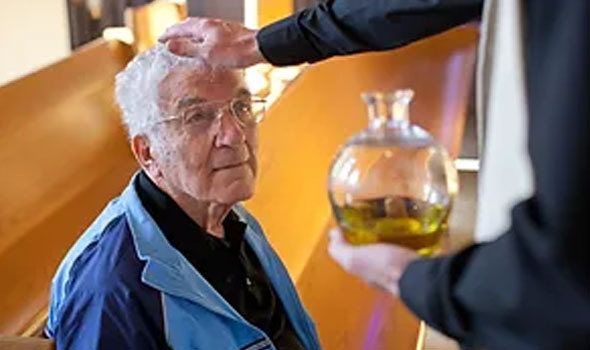
Anointing of the Sick
From the Catechism of the Catholic Church (CCC, 1532):
The special grace of the sacrament of the Anointing of the Sick has as its effects:
– the uniting of the sick person to the passion of Christ, for his own good and that of the whole Church;
– the strengthening, peace, and courage to endure in a Christian manner the sufferings of illness or old age;
– the forgiveness of sins, if the sick person was not able to obtain it through the sacrament of Penance;
– the restoration of health, if it is conducive to the salvation of his soul;
– the preparation for passing over to eternal life.
How do I arrange for Anointing of the Sick at St. Francis Xavier Church?
Please call parish office at (573) 395-4401 if you or someone else would like to receive Anointing of the Sick. While this sacrament is intended for those who suffer from a serious bodily ailment due to injury, illness, or old age, it is not necessary that someone be at the point of death to receive Anointing.

Matrimony
From the Catechism of the Catholic Church (CCC, 1601):
“The matrimonial covenant, by which a man and a woman establish between themselves a partnership of the whole of life, is by its nature ordered toward the good of the spouses and the procreation and education of offspring; this covenant between baptized persons has been raised by Christ the Lord to the dignity of a sacrament.”
How do I arrange to be married at the St. Francis Xavier Church?
Couples wishing to marry at St. Francis Xavier Church must contact the parish office (573) 395-4401 at least six months prior to the desired date. Only after speaking with a priest can a date be confirmed.
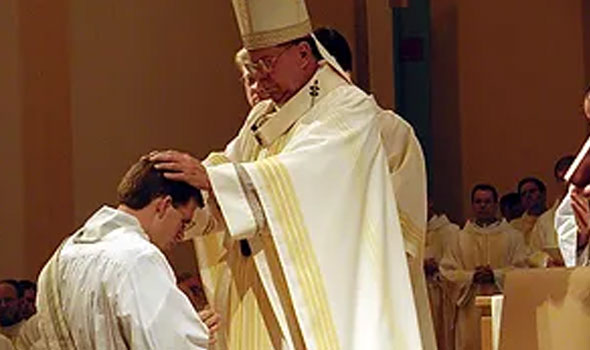
Holy Orders
From the Catechism of the Catholic Church (CCC, 1536):
“Holy Orders is the sacrament through which the mission entrusted by Christ to his apostles continues to be exercised in the Church until the end of time: thus it is the sacrament of apostolic ministry. It includes three degrees: episcopate, presbyterate, and diaconate.”
If you are discerning a vocation to the priesthood or diaconate, contact the parish office at (573) 395-4401, or speak with the priest or deacon at your parish.
